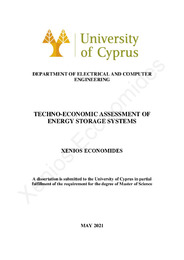| dc.contributor.advisor | Ellinas, Georgios | en |
| dc.contributor.author | Economides, Xenios L. | en |
| dc.coverage.spatial | Cyprus | en |
| dc.creator | Economides, Xenios L. | en |
| dc.date.accessioned | 2022-02-16T09:51:46Z | |
| dc.date.available | 2022-02-16T09:51:46Z | |
| dc.date.issued | 2021-05-31 | |
| dc.identifier.uri | http://gnosis.library.ucy.ac.cy/handle/7/65054 | en |
| dc.description.abstract | Globally the interest on energy storage systems (ESSs) is increasing as one of the main technologies that enable towards a climate neutral economy. This interest, specific for the battery energy storage systems (BESSs), is showing on the sharp progress in lowering their costs and increasing their performance. The aim of this work is to do a comprehensive survey and an in-detail analysis of the costs and benefits of ESSs to support the 2030’s roadmap of the Power System of Cyprus (PSoC). In order to reach this target and to select suitable options of electricity storage specific for the case of the PSoC, an identification rule and ranking methodology took place. A techno-economic assessment of the selected storage solutions is following, which examines the options of distributed small-scale storage to be installed behind-the-meter (BTM). The BTM storage is located at the side of the consumer/prosumer and its aim is to increase the self-consumption from locally produced RES energy and at the same time to reduce the total cost of imported electricity. The study of this work initially makes an overview of the electricity storage technologies which are available in the market and have been tested in laboratories. Then, the key performance indicators regarding technical, commercial and environmental factors are identified. These indicators are related with the performance of both small and grid scale storage systems which are suitable for the case of the PSoC. Subsequently, is carried out a mapping at general level between the available electricity storage technologies and the services that they are able to provide. In this work, in order to evaluate the case of distributed BTM small-scale storage, the approach of Net-Present-Value (NPV) is applied. Moreover, the ESSs have various benefits such as the reduction in the total annual consumption of electricity from the grid, the reduction of the levelized cost of electricity for the consumers and the RES share in the electricity production is increased. | en |
| dc.language.iso | eng | en |
| dc.publisher | Πανεπιστήμιο Κύπρου, Πολυτεχνική Σχολή / University of Cyprus, Faculty of Engineering | |
| dc.rights | info:eu-repo/semantics/openAccess | en |
| dc.rights | Open Access | en |
| dc.title | Techno-economic assessment of energy storage systems | en |
| dc.type | info:eu-repo/semantics/masterThesis | en |
| dc.contributor.committeemember | Grigoriadis, Dimokratis G.E. | en |
| dc.contributor.committeemember | Charalambous, Charalambos A. | en |
| dc.contributor.committeemember | Hadjidemetriou, Lenos | en |
| dc.contributor.department | Τμήμα Ηλεκτρολόγων Μηχανικών και Μηχανικών Υπολογιστών / Department of Electrical and Computer Engineering | |
| dc.subject.uncontrolledterm | ENERGY STORAGE SYSTEMS | en |
| dc.subject.uncontrolledterm | POWER SYSTEM OF CYPRUS | en |
| dc.subject.uncontrolledterm | SELF-CONSUMPTION | en |
| dc.subject.uncontrolledterm | PROSUMERS | en |
| dc.author.faculty | Πολυτεχνική Σχολή / Faculty of Engineering | |
| dc.author.department | Τμήμα Ηλεκτρολόγων Μηχανικών και Μηχανικών Υπολογιστών / Department of Electrical and Computer Engineering | |
| dc.type.uhtype | Master Thesis | en |
| dc.contributor.orcid | Ellinas, Georgios [0000-0002-3319-7677] | |
| dc.gnosis.orcid | 0000-0002-3319-7677 | |

